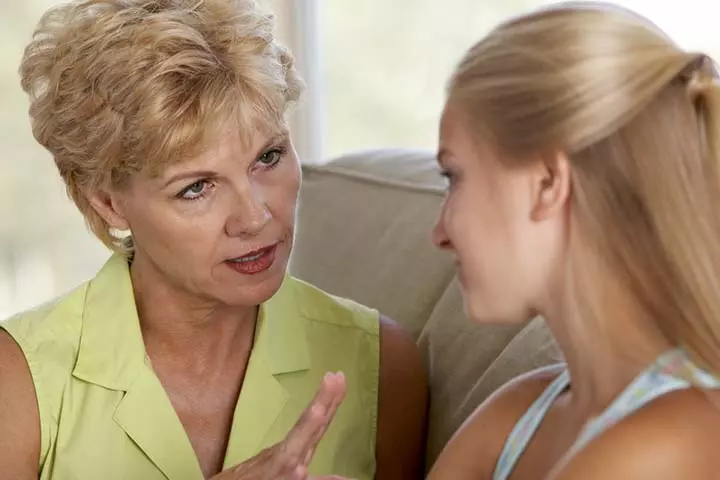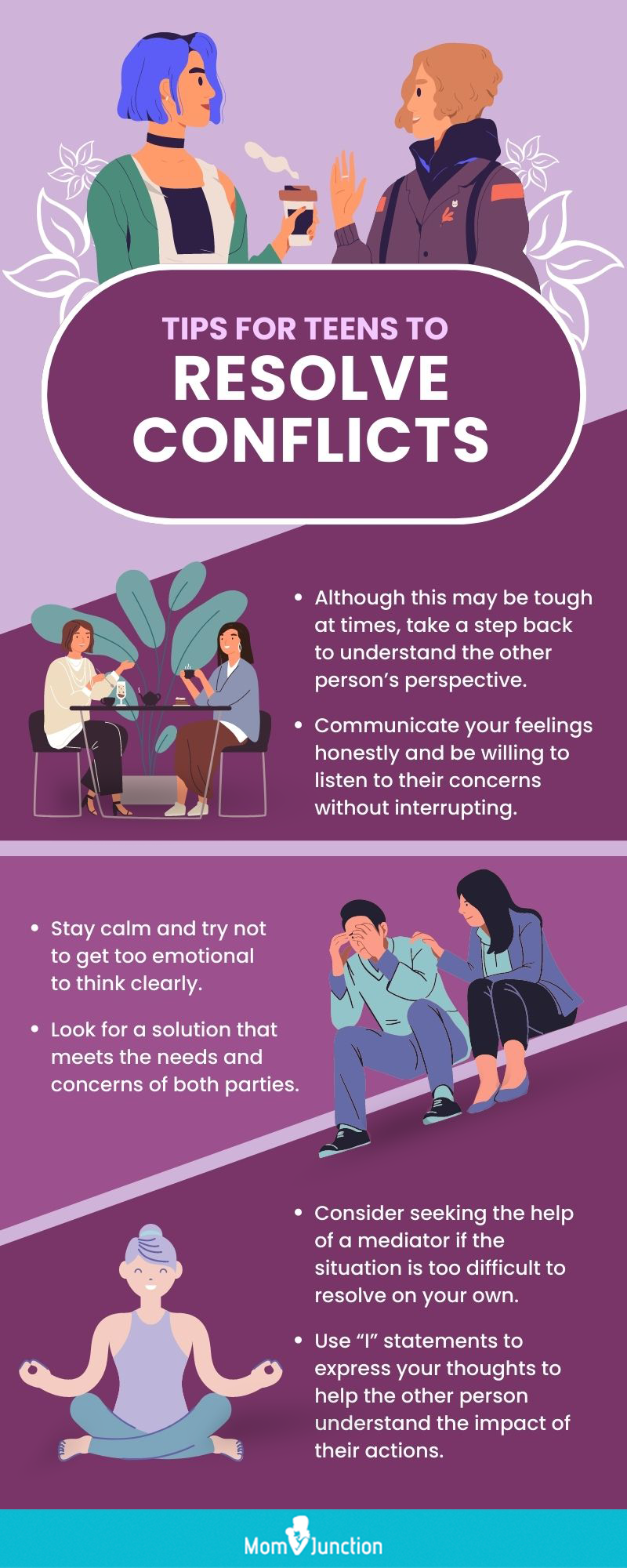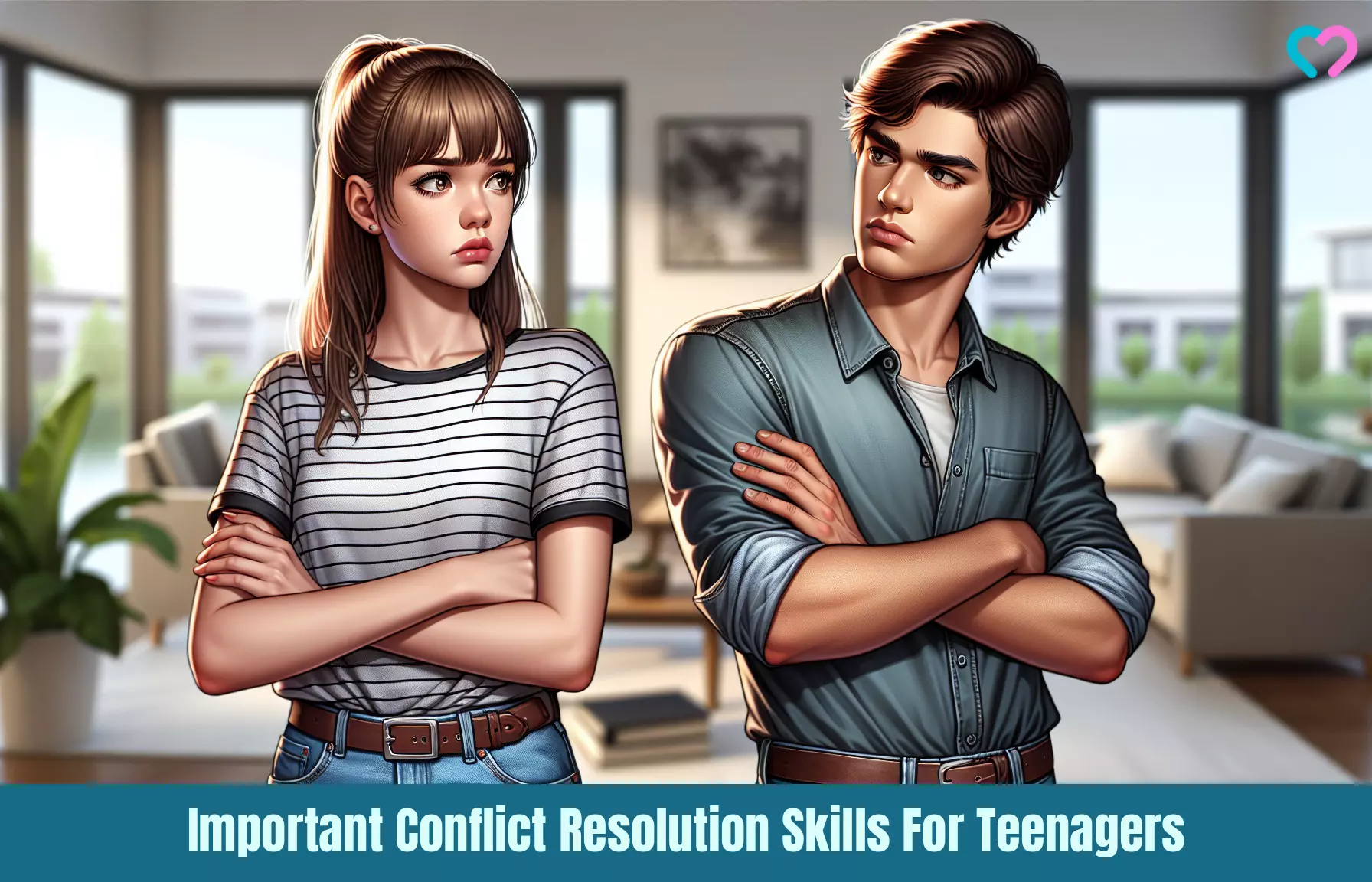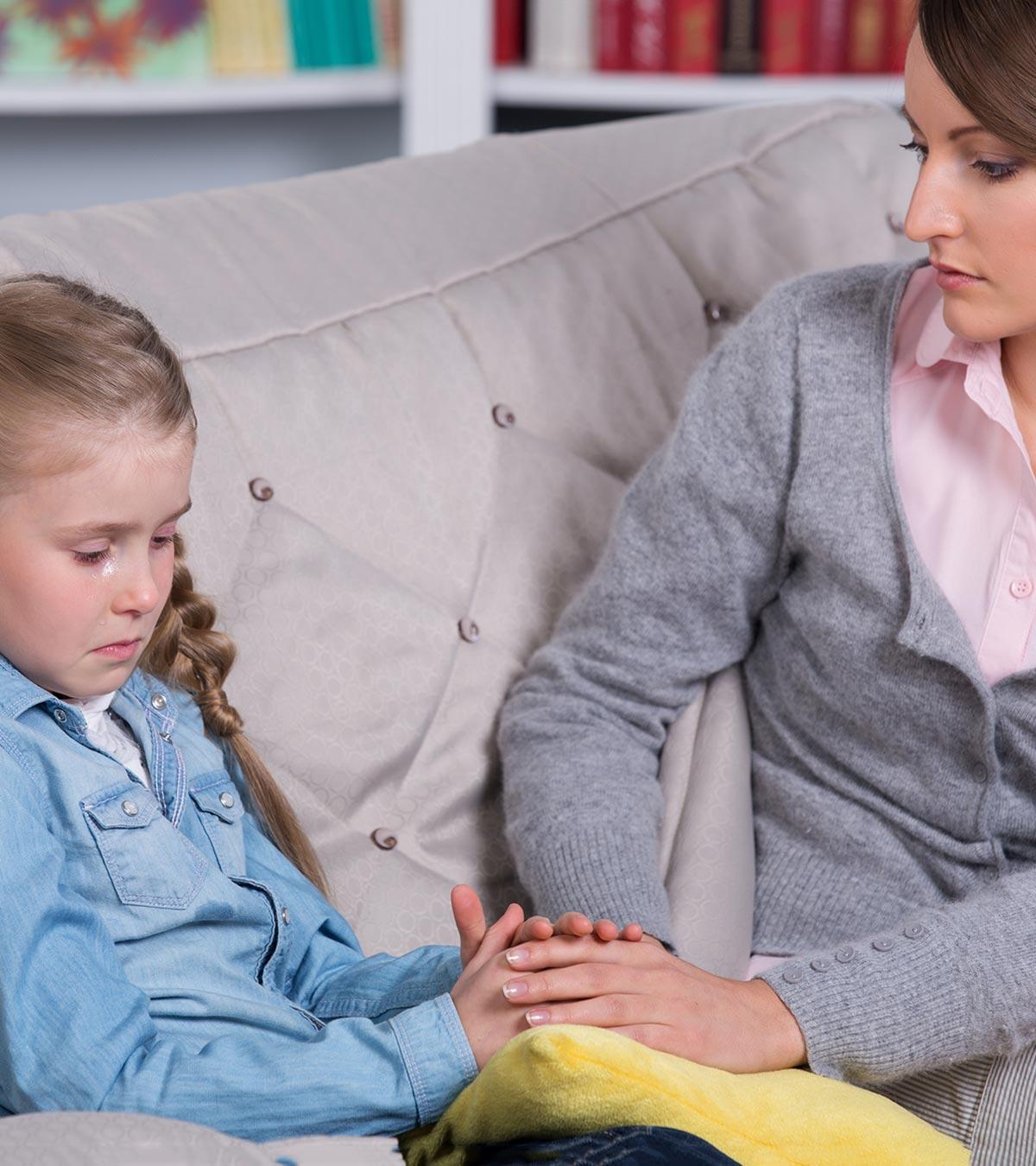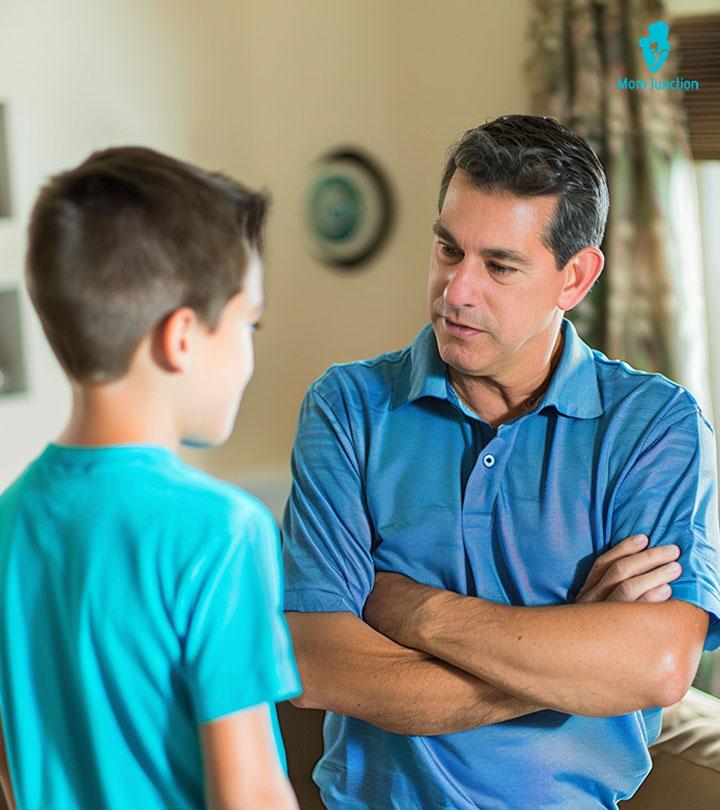
Image: Shutterstock
Conflicts are a part of life, and thus, conflict resolution skills for teenagers are important to help them deal with things more efficiently. Teens are an age during which there are a lot of hormonal and emotional changes happening in the body. These changes make temper tantrums, conflict, and lashing out on other common teenage behavior traits (1).
There is a common complaint of others not getting how they feel and what they are going through. Therefore, to make these years manageable, it is essential to teach conflict resolution strategies to your teen. Read on to know more about these skills and the ways in which you can teach them.
Why Does Conflict Occur?
Image: Shutterstock
Conflict is part of life. No matter how much you want to protect your child from it, she has to face this reality. Conflict can occur within the family, with siblings and parents, with friends, and with society in general. But the one thing you need to teach your teenagers is that a conflict need not be a negative experience. Remember, conflict can lead to change, positive change!
Consequences of Teenage Conflicts
Conflicts may lead to challenging situations for teens since they often lack the necessary skills to tackle them. At home, unresolved conflicts can lead to strained relations. Outside, it can lead to broken friendships, hours of detention, and even violence!
Teaching Conflict Resolution Skills For Teenagers
As a parent, it is part of your job to help your child navigate life without too many hiccups
. Start early and teach your teenager some easy ways to manage conflict. She may not thank you for it today, but you can pat yourself on the back for a job well done!
Teach your teenager the following conflict resolution ‘commandments’ (2):
Commandment 1:
Conflict is a reality. There is no escaping the fact. Hiding won’t solve anything.
You can use several techniques to teach your teen how a conflict can be solved. Nellie Williams, a mother of three girls, uses her police training experience to teach her teen daughter how to resolve a conflict or a problem. She writes, “I use my police training and the PAT (problem analysis triangle) to explain how a problem could be sorted and that it is much like a triangle, there are three sides to a triangle, and if one side is removed, there’s no triangle and therefore no problem. For example (Side No 1) Teenager {annoyed} (Side No 2), there are no clean mugs (Side No 3) they’re all in the dishwasher. By emptying the dishwasher, the triangle collapses, the mug cupboard is full, and the teenager is happy (i).”
Commandment 2:
You can’t wish the problem away. Don’t pretend and put on a mask. Keeping your feelings cooped inside won’t work.
Commandment 3:
Learn to deal with the problem, not the person. Conflict occurs because of a particular issue, not because of a person. Don’t make it personal.
Commandment 4:
Image: Shutterstock
Be respectful and practice tolerance. Listen to the other person. Really listen. Listening to your parents or teachers may seem like a drag but zoning out is not the solution.
Commandment 5:
Be assertive. You don’t need to be either passive or aggressive to deal with teen conflicts. You need to be assertive. Practicing assertiveness means putting your views forward confidently and calmly.
Commandment 6:
Learn to negotiate and work in collaboration. This is the most important skill you need to learn. Negotiating and working with other people as a team are skills that will serve you in the long term.
Commandment 7:
Stick to the present. Don’t drag in past issues. Doing so will only muddy the conflict further.
Commandment 8:
Image: Shutterstock
The silent treatment does not work. Sulking is as bad as getting aggressive – it won’t help in problem-solving. Talk it out.
Commandment 9:
Be understanding. Try to put yourself in the other person’s shoe. Don’t get defensive and analyze the situation.
Commandment 10:
Learn to say sorry. Stand in front of the mirror and practice, if the need be! If you are wrong, accept it. Doing so will not make you a wimp. Only a strong person has the strength to say ‘sorry’. This simple word can work like magic, try it!
These commandments are skills that will help your teenager not just deal with conflicts, but with life in general. But teenagers are stubborn. When you find yourself losing patience, take a deep breath. Remember, you too were a teenager once.
Frequently Asked Questions
1. What is the best technique for handling conflict ?
Several conflict resolution strategies and techniques can be used to handle conflicts. However, the best and most steps to follow include active listening, understanding, accepting, analyzing the situation, acknowledging the issue, and communicating effectively (3).
2. How do you develop conflict resolution skills?
Conflicts are unavoidable. However, conflict management/resolution skills can be learnt with practice. Understanding your emotions, values, and communication style, actively listening to others, practicing effective communication and assertiveness, and learning conflict management techniques, such as negotiation and compromise, are a few ways to resolve conflicts. Remember, stress makes conflict management difficult. So, learning practical stress management techniques, such as meditation and deep breathing, is also vital (4).
3. What is the first strategy when resolving a conflict?
Understanding and accepting the situation is typically the first step to resolve a conflict. When you understand the problems and pay attention to the feelings and perspectives of all the parties involved, you are more likely to find a middle ground. Remember, accepting the situation lays the foundation for effective communication, which is essential to find a solution.
4. How can teenagers avoid conflict?
Communicating clearly and calmly, practicing empathy and fairness, paying attention to others’ perspectives, and being assertive whenever needed are a few ways teenagers can avoid conflict (5).
The physical and emotional changes at the start of your child’s adolescent years may cause them to rebel. Therefore, it is critical to begin teaching problem-solving, anger management, and conflict-resolution skills to teenagers from an early age. Also, be available for them, listen to them, make friends with them, and be informed of what is going on in their lives while respecting their privacy. Also, remember that these raging hormones will pass, so don’t let them leave a lasting imprint on your teen’s life.
Infographic: Ways To Resolve Teenage Conflicts
Conflict is a natural part of any relationship, but it can be challenging for teens to navigate as they are still developing their social skills and emotional intelligence. The infographic below highlights ways to resolve conflicts for teenagers. Save and share it with your child. Illustration: Momjunction Design Team
Key Pointers
- Hormonal fluctuations during adolescence can lead to conflicts between teenagers and parents.
- Parents can help their teenage children navigate this period by teaching them conflict resolution skills.
- Unresolved conflicts can strain relationships, lead to detention, or even escalate into violence.
- Essential conflict resolution skills for teenagers include acknowledging the reality of conflicts, expressing themselves assertively, and learning to negotiate.
- Teenagers should address problems directly, remain respectful and assertive, avoid bringing up past issues, and be willing to apologize when necessary.
Image: Stable Diffusion/MomJunction Design Team
Personal Experience: Source
MomJunction articles include first-hand experiences to provide you with better insights through real-life narratives. Here are the sources of personal accounts referenced in this article.
i. Counting to teen.https://nelliepompoms.wordpress.com/2015/02/08/counting-to-teen/
References
- Affect and Mood Related to School-Aged Youth (2015).
http://smhp.psych.ucla.edu/pdfdocs/affect/affect.pdf - Teaching Conflict Resolution Skills ToYouth.
https://middleearthnj.org/2019/07/01/teaching-conflict-resolution-skills-to-youth/ - Tips for Managing Conflict
https://www.clarke.edu/campus-life/health-wellness/counseling/articles-advice/tips-for-managing-conflict/ - Conflict Resolution Skills
https://www.helpguide.org/articles/relationships-communication/conflict-resolution-skills.htm - Sibel Dincyurek et al. (2008);The Determination Of The Conflict Resolution Strategies Of University Students That They Use When They Have Conflicts With People.
https://psycnet.apa.org/fulltext/2010-14703-006.html - How to stop conflict before it starts
https://www.colorado.edu/today/2019/04/10/how-stop-conflict-it-starts
Read full bio of Dr. Misha Yajnik
Read full bio of Swati Patwal
Read full bio of Apoorva K






